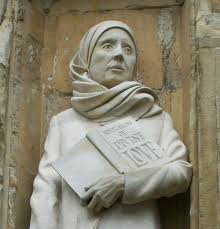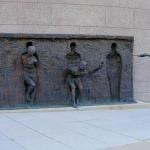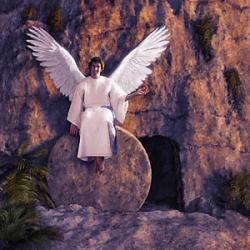I was raised by a father who claimed to have regular conversations with God. My father regularly dropped phrases such as “God told me that . . .” or “The Lord said this to me . . .” into normal conversations. God seemed interested not only in what my father was reading or doing, but also gave him assistance when ordering breakfast at his favorite diner. This was disconcerting for someone who never heard God say anything at all. Was my father special? (He definitely thought he was) Did God not want to talk to me? (I thought that was likely) I understand that there is a series of books called Conversations with God—I looked them up on Amazon and was surprised to find that my father didn’t write them. If I wrote a book with that title, it would be one page long—and that page would be blank.
It wasn’t until I was in my early thirties that I finally confronted my father concerning his claims about conversations with God. We were driving somewhere and Dad dropped into one of his monologues “The Lord told me that . . .”.
“What does that sound like?” I interrupted.
“What does what sound like?”
“What does it sound like when God says something to you? Is it an audible voice? What does it sound like?’
“No, it’s not an audible voice—just a feeling, an intuition, a gut instinct . . . you know . . .”
“If that’s all it is, then I know exactly what you’re talking about. I just don’t call it God speaking to me!:
Our decades long disconnect was ultimately just a difference in language and in confidence. My father trusted his instincts and intuitions so strongly that he called them the voice of God. I did not have that confidence and called them my (fallible) instincts and intuitions. Who knew the divine could communicate in that manner?
Dad passed away more than twenty years ago; he was only five years older when he died than I am now. I have learned a lot over the past many years, particularly the last fifteen or so, about how and where the divine might communicate with me. I am continually reminded of something St. Catherine of Genoa reportedly said, included in a sermon I heard a number of years ago. She said “My deepest me is God”—that simple insight has helped me become more and more comfortable with the possibility that my most powerful inclinations, instincts, and emotions might telling me something deeper than I could construct myself.
I’ve also learned to pay attention to things around me, particularly to apparent “coincidences.” Don’t get me wrong, I don’t believe that all coincidences have a divine message behind them any more than I think that “Everything happens for a reason” is true. Sometimes things just happen. Sometimes there isn’t a greater message behind the random stuff that life gives us. But I pay attention and listen to what’s happening around me more carefully than I used to (some of the time, at least), imagining that maybe, just maybe, the ever-elusive divine might once again be lurking in an unexpected place or event.
A recent case in point. I have been listening more often than previously to podcasts that work at the intersection of culture, the humanities, and religion over the past month, largely because I have cut political podcasts out of my life since the election in November. Last week on “Re-Enchanting,” the guest was Claire Gilbert. I had never heard of her; the podcast intro said, “Dr. Claire Gilbert is an author, lecturer, mentor, and retreat director and was the founding director of the Westminster Abbey Institute” (whatever that is).
Gilbert’s latest book is I, Julian: The fictional autobiography of Julian of Norwich. Julian of Norwich was a medieval mystic who wrote down a series of powerful visions that have become seminally important for many persons of faith over the centuries. The one phrase that many people know her for is All shall be well, and all shall be well, and all manner of things shall be well. Taken out of context, that sounds like the insight of a radically idealistic and impractical person. Even an optimist such as I have a hard time taking it seriously.
Furthermore, things medieval are about as far from my natural wheelhouse, both professionally and personally, as it is possible to get. Still, I like this podcast, I was walking Bovina, and didn’t feel like fishing my phone out of my pocket and finding something more up my alley. Dr. Gilbert was a fascinating interviewee, so good that I thought “maybe I should get that book.” Then the podcast ended, Bovina and I returned home, I headed to campus, and completely forget about Julian of Norwich.
Then this past Tuesday I listened while walking Bovina to the latest weekly episode of “Homebrewed Christianity.” Tripp Fuller is the creator and host of this show, as well as being the founder and energy behind the “Theology Beer Camp” conference that I attended with my son Justin a few weeks ago. He is a serious Bonhoeffer scholar, a strong voice for progressive Christianity, and has very interesting guests on his show. On Tuesday his guest was philosopher Simon Critchley. In my world of academic philosophy, Critchley is a very big deal—a prolific author who has more than twenty books on a vast variety of topics. He’s eloquent and erudite, committed to finding ways to bring philosophy into the public realm.
He is also an agnostic when it comes to religious belief, so when I saw that the podcast episode was about his newest book, Mysticism, I thought “Mysticism???? That’s like me being interviewed about my newest book Differential Calculus for Dummies!” In other words, hardcore philosophers like Critchley are usually as far away from mysticism as I am from high level mathematics. I also would not consider myself to have a lot of affinity with mysticism. But when, during the interview, Critchley named Julian of Norwich as one of the four mystics he spends time with in his new book, I paid attention.
I know almost nothing about Julian of Norwich except that some people I respect have mentioned that she has been important in their spiritual journey. Now this obscure 14th century mystic had shown up on my radar twice in less than a week. I have learned over the years that there often is something important embedded in such “random” coincidences. Amazon will be delivering I, Julian, Mysticism, and Julian of Norwich’s Revelations of Divine Love by this weekend. I strongly suspect that there is something important for me in these books—that’s how I have come to expect the divine to communicate with me.













